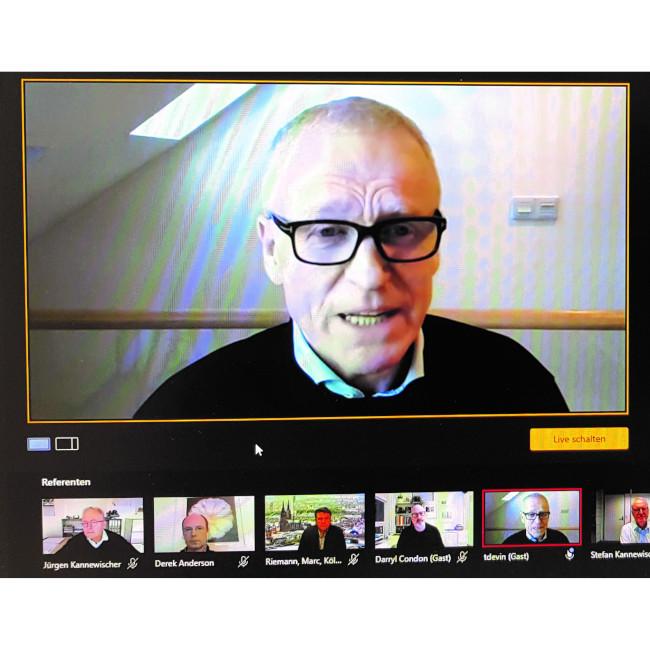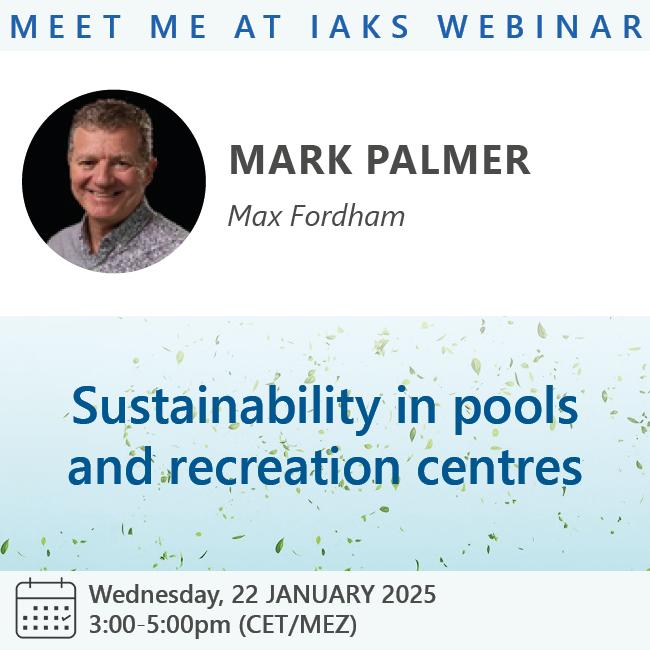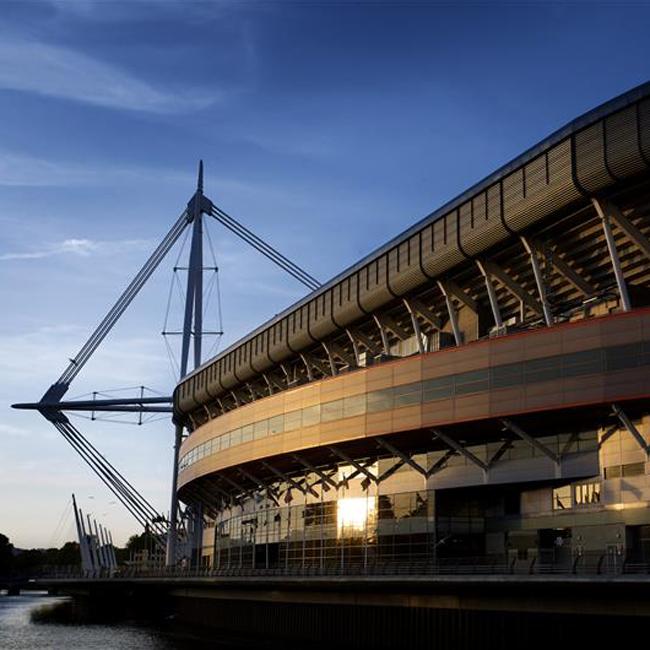IAKS online conference on 30 November 2020 discussed future challenges
The IAKS Swimming Pool Expert Circle offered a public online conference on 30 November 2020 to discuss the current situation of pool operations under Covid-19 conditions and to develop ideas for future pool developments. Panelists from Canada, Germany, Ireland, Norway, Switzerland UK shared their experiences in their countries and provided insights from the architectural, operational and engineering point of view.

Engineer's perspective
Three pool engineers identified possibilities to optimize air ventilation systems to ensure a safe pool environment for users. Based on the observations by Björn Aas (NTNU Norwegian University of Science and Technology, Centre for Sports Facilities and Technology), Tom Devin (Devin Consulting Engineers) and Jürgen Kannewischer (Kannewischer Ingenieurgesellschaft), the conference moderator Dr Stefan Kannewischer (Kannewischer Management) draw the conclusion that the pool water itself is safe due to water treatment and that ventilation systems work efficiently, so no further investment is required to prevent Covid-19 infections.
Learnings:
- Sars-CoV-2 virus is vulnerable to warm and humid climate as to be found in the environment of a pool facility
- No major incident (superspreader event) occured in an aquatic facility
- Ventilation systems work efficiently with 5 to 7 air changes per hour
- High standards in pool water treatment avoid infections by any virus or bacteria
- Under Covid-19 conditions, more fresh air from the outside must be added to the recirculated air. With lower outdoor temperatures, the fresh air must be reheated. This may lead to higher energy costs and lower humidity in the pool hall.
- Engineers want to develop tests for more humidity in the fresh air – as soon as aquatic facilities reopen
Operator's perspective
In a second panel discussion, three operators reported from their experiences related to guest registration, admission process, measurements for social distancing, and staff training. Marc Riemann (KölnBäder), Thomas Meier (GMF) and Derek Anderson (Aura Holohan Group) stated that it is possible to operate a pool facility respecting the Covid-19 requirements but at uneconomical conditions. None of the operators is aware of infection incidents in pools.
Learnings:
- Following safety requirements, capacity was reduced to around 50 percent, but with the same or somethimes higher operational costs. Turnover declined around 35%
- Some operators implemented time slots for guests and online ticketing
- good acceptance
- faster (when entering the facility) and safer (less problems caused by troublemakers)
- although some operators reported lower visitor numbers with time slots
- Organized activity (e.g. swimming lesson) finds continuous request and therefore has helped to compensate loss of earnings
- Signage system, one-way concept, enhanced cleaning and disinfection were introduced
- Staff needed to be trained
- Pre-opening communication
- Video showing the new customer journey (e.g. sanitising stations)
- e-flyer which covered Frequently Asked Questions (FAQs) outlining the changes to expect
- with the purpose to build
- familiarity
- comfort / faith
- excitement
- Ongoing communication to inform guests
- Security advices via sound system (every 30 minutes)
- Check-out with QR code (to avoid paperwork for guests)
- Analysis and documentation (e.g. staff counted number of guests and took pictures to identify critical spots)
- change in behaviour
- duration of stay: guests need more time at changing rooms
- after lockdown: more sport oriented guests, less recreational oriented guests
- swimming lessons: high interest after lockdown, even for adult groups
Architect's perspective
The final round of experts led to design challenges. From the architects‘ perspective, Darryl Condon (HCMA), Gar Holohan (Aura Holohan Group), and Michael Hall (FaulknerBrowns Achitects) discussed how Covid-19 might influence the design of public aquatic facilities in the future. Facilities developed with „universal design“ find it easier to adapt to the new situation.
Learnings:
- people in charge may consider more pandemics / challenging situations to occur
- challenging situation for the facilities which are in the mid of design
- requirements by the guests might not correspond to the requirements by scientists
- older facilities may have to close
- new standards for comfort zone? separate access, large entry, one-way system, spacious changing rooms, air quality monitors?
- More pop-up pool facilities to respond to changing behaviours?
- Outlook: more request for facilities with mixed use (sport and recreational acitivity, community hub, library, ….)
- The behavioural changes of our societies are difficult to predict and will have to be observed closely with regard to the impact for the pools
A final conclusion is that pools have proved to be safe places under Covid-19 conditions and experts do not expect dramatic changes to be needed to prevent infections. But is has to be observed whether behavioural changes of our societies will ask for a change of pool offerings in the future.




